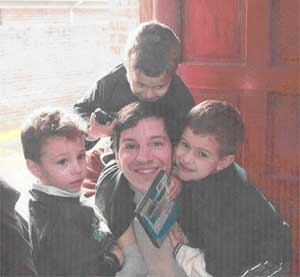Attention Deficit Disorder (ADD)
CHADD (Chadd.org)
CHADD is a comprehensive organization providing support, understanding, information, and resources for families where some members (adults and children) are ADD/ADHD. There is also a magazine that can be informative and helpful, ADDitude
WHAT IS ATTENTION DEFICIT DISORDER?
First, let me tell you what ADD is NOT.
Children and adults with ADD are NOT lazy or bad.
Now, here’s what ADD is: Attention Deficit Disorder (ADDH or ADD/H) is a neurological condition that can negatively impact lives of children and adults and can cause serious damage to family relationships – if not understood.
But in fact, ADD is really a misnomer. It should be called AV, for Attention Variable, and skip the Disorder. Variable because many people who are seen as distracted can hyper-focus. When involved in something that really interests them, they can focus for hours. In fact, they can get so busy at the computer, reading the paper, playing with their toys, whatever – that they don’t hear what is said to them. Even if they give a response!
Some children and adults, though, are criticized as day dreamers. This is another variation of ADD; internally, the person is hyper focusing on inner thoughts. They have the same neurological condition that just demonstrates itself in a quieter version.
Typical behaviors associated with ADD include disorganization, impulsivity, hyperactivity, distractibility, physical restlessness, moodiness, forgetfulness, and explosive anger.
These behaviors are hard to live with – for family members and for the ADD person.

Let’s say it up front:
It’s hard being ADD.
It’s hard living with someone who is ADD.
Besides the disorganized mess, there are broken promises, chores not done, appointments not kept; so many disappointments.
For some, the impulsivity and anger come together; the anger is impulsive, arising without much provocation or warning. Combine this, now, with a low frustration tolerance. Some (not all) people with ADD may blow up, but then blow over, meaning once they express their anger, it’s out and they can carry on as before. What they don’t usually understand is that the person on the other end of their fury can’t just carry on; the intensity of their explosion leaves a painful wake that doesn’t subside.
Unfortunately, the negative characteristics of people with ADD are the most recognized.
So now, let me tell you the really good news
ADD children and adults have many positive attributes that are overlooked; they are smart, creative, sensitive, empathic, perceptive, energetic, spontaneous, fun; they rarely harbor resentment. They have high energy when interested in the subject. And, they often can see situations and problems from a unique perspective.
It is very hard being partnered with and a parent to someone who is ADD – which causes tremendous relationship problems. Recognizing that the person (whether child or adult) may not be behaving badly intentionally is the first step. Strategies for living together and functioning smoothly can be learned.
Techniques can be learned for dealing with most of the typical negative characteristics. With a good understanding of ADD, most of the negative effects can be minimized. Learning what is not useful can eliminate much family stress. For instance, telling an impulsive person to “just count 10 before speaking out,” is useless advice since the impulsivity doesn’t have a “before.” Scolding someone for being forgetful or losing track of time is also useless.
Therefore, it’s important for the ADD person and all family members to learn more about ADD and all the strategies for decreasing the negative aspects and enhancing the positive ones.
Medication may be helpful, but not necessarily productive if not combined with individual, couples, and/or family therapy. Everyone’s feelings about living in a home with someone who is ADD is important – all of their feelings need to be heard. Then, strategies need to be devised so that home life (school and work) goes smoother.
This is some of what we do in therapy with the families of those with ADD.

Getting Started is Easy
Free 20 Min Chat
Call to discuss your needs.
Call for Appointment
Call or Email to begin your journey.
1st Session!
Let's get started healing together.
Contact Me
Ask a question or call for a secure virtual session for people in the U.S. and internationally.
For emergencies call 911 or visit your nearest hospital.
